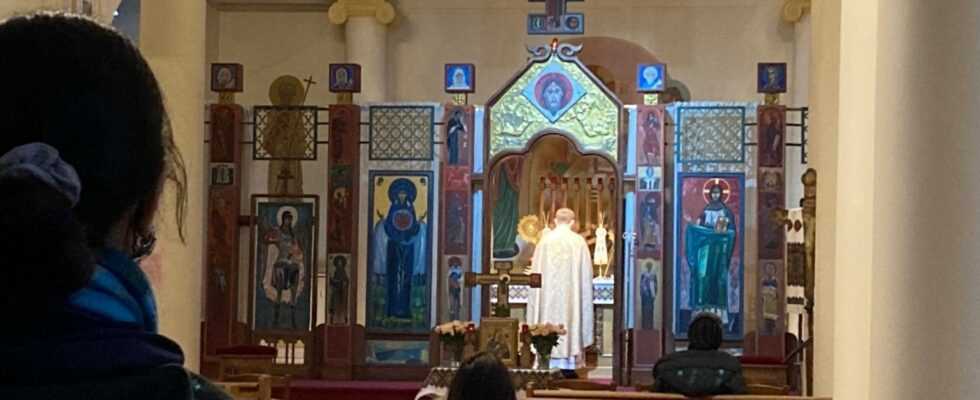Marion Gauthier, edited by Solène Leroux
modified to
7:40 a.m., February 24, 2022
The world is facing “a moment of peril”, UN Secretary-General António Guterres said yesterday. Difficult to follow the events from a distance for the Ukrainian diaspora, which gathers and tries to help as it can the relatives threatened. Every evening, at 9 p.m., they are invited to pray at their homes. At the Saint-Volodymyr-le-Grand cathedral, in the heart of Paris, they meet to also attend mass. A large painted wooden portico opens onto the altar. On the side, the portraits of the “100 celestials”, those killed in 2014 in Maidan, the place of independence in Kiev, during the pro-European demonstrations which preceded the war with the pro-Russian separatists.
In the smell of incense, a dozen worshipers, looking serious or distraught. “That’s scary,” groaned Natalia, stifling a sob. “It’s not possible!” she repeats. “Many Russians live in Ukraine, many Ukrainians live in Russia: killing each other between brothers is not possible!” The sexagenarian came here to calm her anxiety; she helps by sending money to Ukraine, where her family still lives. “It’s mostly for soldiers,” she says. “It hurts my heart. You have to give, you have to pray, you have to do everything.”
To be the “promoters of historical truth”
“May God watch over all the soldiers, over those who have suffered the consequences of war”: these prayers of supplication have been recited at each celebration, for eight years that the fighting has been tearing the East apart, explains Oleksandr Bilyk, the seminarian. Far from his family, the feeling of helplessness torments him.
“I live every conversation as if it were the last,” he confesses, “because I don’t know what will happen tomorrow.” The young man, who arrived in Paris to study canon law four years ago, thinks aloud: “What we, Ukrainians in the diaspora, can do is already be promoters of historical truth. There is an information war and if we lose it, the war in the first sense of the term will be much more difficult to win.” He thinks of the mobilized reservists, of the soldiers who have already fallen: “We must keep hope, so that their sacrifice is not in vain.”
“Only Hope and Prayer”
Exactly, Ivana is worried about her brother who is leaving to fight; he was supposed to come to France, but wishes to stay in Ukraine. “He’s a patriot!” says Ivana, with a bitter smile. “Every day, I get up wondering what’s going on,” she says, “I go to bed hoping that the situation calms down. My heart hurts, every day”. For the au pair, “there is only hope and prayer”.
The Church must organize psychological support for its tried and sometimes isolated parishioners, torn about the help to be provided. “More and more of the faithful are beginning to have psychological difficulties, to have depression,” said the rector of the cathedral, Ihor Rantsya. The pastoral service must meet “to prepare to react”, he specifies, and to coordinate donations (medicines, clothing, money) in the event of a humanitarian crisis, on the other side of Europe.
